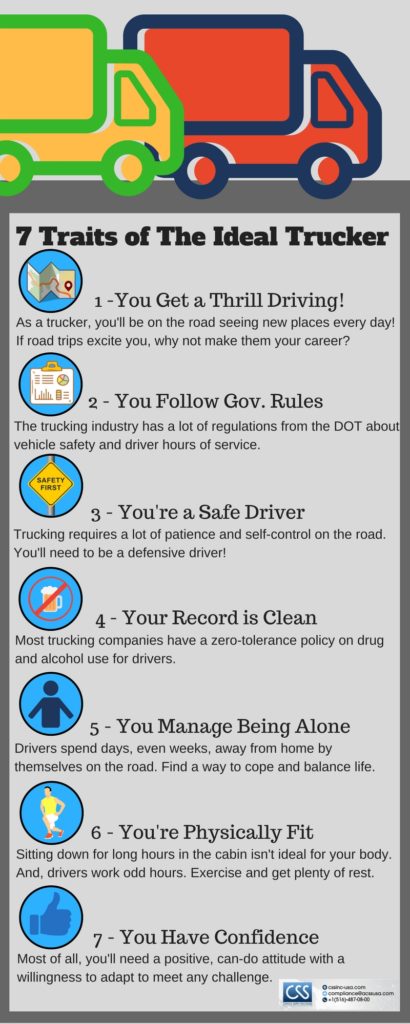Most people tend to think of trucking as a fairly straightforward career that requires little training or expertise. After all, you just transport a load from point A to point B, right? Nothing could actually be further from the truth.
To begin with, you’ll need a special truck driver license, known as a CDL, to operate commercial freighters. It’s not difficult to obtain but requires some studying, if you plan on passing the first time.
Next, truckers are constantly under close scrutiny by law enforcement and their dispatch for compliance with safety regulations from the DOT. Every system of their vehicle is tracked by internal hardware to monitor things like fuel economy, idle time, RPM, speed, and relative GPS location. Drivers need to familiarize themselves with all that is legally expected of them to effectively perform.
And, you should know that beginning your trucking career will prove somewhat expensive. If you’re lucky, you might find a company that offers a paid CDL training. Otherwise, all your schooling and exam costs are on you.
Then you’ll have to decide: do you become an OTR driver (“over-the-road” using a company vehicle) or an owner-operator (leasing or owning your own ride). There are pros and cons to each path.
It’s never an easy job to get up every day at odd hours and just drive across the country. But at the same time, it can be very rewarding to the right person.

7 Traits that Describe the Ideal Trucker
Maybe you’re reading this wondering if trucking is really for you. The best thing you can do is simply ask a trucker what it’s like! Reading blogs like these are great resources.
Below we’ve consolidated the experiences of our drivers into 7 common traits most truckers need to be successful. If you’re exploring career paths and considering trucking, ask yourself if each of these statements describe you:
(1) – You Get a Thrill Driving
First the obvious: if you don’t enjoy long road trips, trucking probably isn’t for you. As a commercial driver, you could travel as much as 14 hours a day across the country. Along the way, you’re permitted to stop for fuel and allotted breaks (30 minutes every 8 hours). That’s it! This is a job that requires you to be constantly on the move. You’ll have to learn to deal with heavy traffic, unpredictable road conditions, and being seated for hours on end.
However, if you enjoy traveling, this is the perfect career choice! You’ll have ample opportunity to see different states and experience the local culture (at least as much a rest stops allow).
It’s all about how you let your personality shape the job. If you think about it, no two drives are the same. Each time you rev up that engine for a haul it’s a new opportunity for an adventure. Forming “trucker stories” from your rides can be a fun way to share the experience.
(2) – You Follow Government Regulations
As we mentioned before, trucking involves a lot of regulations from the DOT on both the state and federal levels. These rules involve the proper use of your electronic log device (or ELD) and maintenance of your vehicle’s various systems. You’ll be oriented on most of these as you study for your CDL and find your first company.
If you don’t stay on top of the processes and procedure, you may be subject to serious penalties by law enforcement (who can stop your vehicle at any point in a haul for an inspection). Enough mistakes and you’ll be out of the job at your company and may even have your CDL revoked.
While you don’t typically need a college degree to become a trucker, you need the ability to read and interpret legal jargon critically. If you don’t know your rights and responsibilities as a trucker, you could be liable in a dispute. Your employer could also take advantage of your ignorance in a number of different ways to rob you of benefits.
You should also have some ability to navigate different programs and tools online. Your tractor will be equipped with the now mandated ELD. Dispatch will monitor it in real-time to see how you manage company time. You should be somewhat tech savvy to understand how those devices work. And, be flexible! The technology and the associated regulations are bound to change as they continue to become more precise.
You’d also do well to read up on the current trucker news to get a grasp of where the industry is headed. There’s a ton of resources out there on the web to educate yourself, though eventually you may want to consider joining a trucker union.
(3) – You’re a Safe Driver
Driving a massive rig isn’t the same as your ordinary car. That’s why you need a completely different license to drive a semi truck!
Your biggest concern should be for your personal safety and that of everyone on the road. This will require patience to handle hot head drivers around you. People hate being behind trucks and will often try dangerous maneuvers to get around you. Don’t panic. Just keep driving forward and remain calm. From time to time, you’ll have a huge temptation to let out some road rage. Keep your emotions in check and don’t get overconfident.
Some truckers get this idea that if they complete the haul ahead of time, that means more time for the next towards the next job, and thus more income that week. Usually, a truck driver salary is paid in cents per mile driven (or CPM). You want optimal timings, but never at the expense of safety. There’s never an excuse for speeding or in any way driving recklessly.
You might feel like “king of the road” in your huge semi but let that feeling get to your head.
Keep vigilant and be proactive. Plan ahead of time personally before each haul for any major weather or road hazards along your route. Anything can happen on the road, so you should be ready for any situation. We recommend you keep a set of essential items in your vehicle at all times, like a toolbox, first aid kit, a heavy duty flashlight.
The company should have a standard set of procedures to follow in case of an accident, breakdown, or theft. You’re going to need to familiarize yourself with the processes and know who to contact when. And, you must follow through with correct documentation in reporting the incident.
In emergencies, you must remain professional. That’s not always easy. Our natural reactions when things don’t go our way is often to get angry. Trucking requires a tremendous amount of self-control.
(4) – Your Record is Clean
Following in line with the last trait, to be an effective driver you’ll need a clean driving record at every stage of your career. Too many DOT violations will make it enormously difficult to keep a job in the field.
While operating a commercial truck, you’re subject a random drug and/or alcohol test at almost any given period. Keep your body clean of any substances or stay out of trucking.
(5) – You Manage Being Alone
Probably the hardest issue for truckers to deal with is the extended period of time they’re alone, away from family and friends for days and even weeks at a time. Being absent physically from your spouse or children can put a strain on the bond.
This doesn’t mean that serious relationships are incompatible with the life of a trucker. It just means you will need to be more creative and understanding with your partner and family. You should prioritize as much time with your loved ones as your company will allow. (We earlier published “6 Ways to Balance Work and Family Life as a Truck Driver” if you’re looking for a more practice guide to help).
Being alone has benefits too. You will have a lot of time to think to yourself about life. Many drivers enjoy the quiet atmosphere of the cabin and the freedom to blast the radio or listen to podcasts.
Other people get bored or lonely themselves on the job. If that’s you, you might want to consider looking for team trucking jobs! This is where you operate with a teammate in the cabin and you both take turns driving at different intervals. Often couples team drive to stay together throughout the week and partake in the trucking life together. Teams tend to make more money as well.
Whatever you do, you should try to change your mindset about the job and view the road as your own adventure.
(6) – You’re Physically Fit
Part of being stuck in your truck for long hours is the toll it takes on your health. You will need to know how to compensate for this by committing to a fitness plan and overall managing your wellbeing. When you have off time, be active, eat right, and get your rest.
If you don’t take care of yourself, you’ll be less alert on road and generally feel miserable. But you should realize that just being tired is natural! Every job worth doing is hard work. Give it time and at least finish a whole year before deciding if it’s the career for you.
(7) – You Have Confidence
Finally, trucking effectively means taking initiative, adapting, and being confident. Basically, you need to be self-sufficient. As a trucker, you don’t have someone to hold your hand every step of the way. In fact, you’ll literally be on the road with no one from the company physically watching you. You’ll need the grit to tackle any challenge at any time.
The difference between a good driver and the best of the best is their attitude! No matter what, they remain positive and ready for anything.
Jumping into any new industry is scary because it’s something new and unknown. Take your time as you search.
Trucking is a unique and enjoyable career that may be the right fit for you! We have the some of the best management around and offer a competitive package of benefits to all drivers. Check out our homepage for a link to the application program or request a callback.
For trucker veterans, what was it like for you just getting started? How did you survive the first year? We’d love to hear from you.
